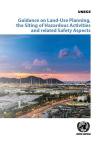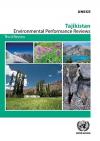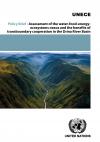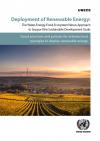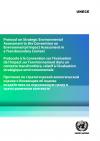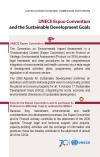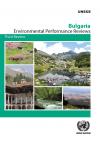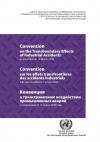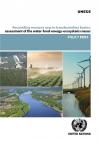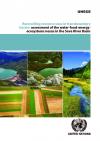Publications
Displaying Results 181 - 200 of 919
- English
The Guidance on Land-Use Planning, the Siting of Hazardous Activities and related Safety Aspects has been developed in close cooperation with the constituencies under three legal instruments of the United Nations Economic Commission for Europe (UNECE) – the Convention on the Transboundary Effects of Industrial Accidents (Industrial Accidents Convention), the Convention on Environmental Impact
- English
The publication contains the authentic text of the Convention on Environmental Impact Assessment in a Transboundary Context (Espoo Convention) as amended on 27 February 2001 and on 4 June 2004 in English, French and Russian. The second amendment to the Espoo Convention (adopted in
- Pусский
- English
- English
This policy brief synthesizes the main findings and recommendations from the assessment of the water-food-energy-ecosystems nexus ─ essentially of intersectoral links, trade-offs and benefits ─ in the Alazani/Ganykh River Basin, shared by Azerbaijan and Georgia in the Caucasus, that has been carried out in the framework of the UNECE Water Convention’s programme of work for 2013–2015. The
- Pусский
The present publication contains the third Environmental Performance Review of Tajikistan. The report takes stock of progress made by the country in the management of its environment since 2010. It also covers issues of specific importance to the country related to legal and policy frameworks, the financing of environmental policies, greening the economy, and integrating environmental concerns
- English
The present publication contains the third Environmental Performance Review of Tajikistan. The report takes stock of progress made by the country in the management of its environment since 2010. It also covers issues of specific importance to the country related to legal and policy frameworks, the financing of environmental policies, greening the economy, and integrating environmental concerns
- English
This policy brief synthesizes the main findings and recommendations from the assessment of the water-food-energy-ecosystems nexus, linked with a study of benefits of transboundary cooperation, in the Drina River Basin, mainly shared by Bosnia and Herzegovina, Montenegro and Serbia which was carried out from 2016 to 2017 in the framework of the UNECE Water Convention’s Programme of Work.
- English
The 2030 Agenda for Sustainable Development includes Sustainable Development Goal (SDG) 7 on access to energy and the related targets set the ambition for increasing the share of renewable energies in the energy mix. Their achievement is closely linked water management (part of SDG 6 on water and sanitation) but also to many other SDGs, notably on food security and sustainable agriculture (SDG 2
- English
The publication contains the authentic text of the Protocol on Strategic Environmental Assessment to the Convention on Environmental Impact Assessment in Transboundary Context in English, French and Russian, as edited following a correction procedure that addressed editorial errors of a technical nature identified in
- English
The brochure has been prepared by the Inter-Agency Coordination Group for Industrial and Chemical Accidents. The Inter-Agency Coordination Group is an informal forum that brings together international organizations and institutions working on the prevention of, preparedness for and response to
- English
By providing an intergovernmental science and policy platform for reducing air pollution and its impacts, including climate change, the Air Convention contributes to the attainment of 11 of the SDGs.EN
- English
UNECE Espoo Convention and Sustainable Development Goals The SDG postcard is available in English. Prepared by the UNECE secretariat, the postcard presents selected examples of how the Convention and in particular, its Protocol can work towards Sustainable Development Goal targets.
- English
The present publication contains the third Environmental Performance Review of Bulgaria. It takes stock of progress made by the country in the management of its environment since 2007. The publication covers issues of specific importance to the country related to legal and policy frameworks, the financing of environmental expenditures, greening the economy, air protection, water and waste
- English
Convention on the Transboundary Effects of Industrial Accidents - as amended on 15 December 2015Full Text
- English
This policy brief provides an introduction towards the different stages of and benefits from an assessment of the water-food-energy-ecosystems nexus, with a specific focus on resource use in transboundary basins. It summarizes the experience from the first three transboundary basins where a methodology for participatory assessment of intersectoral linkages, trade-offs and benefits in
- English
Industrial accidents can happen anywhere, anytime. Often, they have severe consequences on human health and the environment, including in other affected countries. The UNECE Industrial Accidents Convention helps its Parties to prevent industrial accidents, especially those with transboundary effects, and to prepare for and respond to such accidents if they occur. This brochure explains why
- English
This policy brief synthesizes the main findings and recommendations from the nexus assessment of the Sava River Basin shared by Bosnia and Herzegovina, Croatia, Montenegro, Serbia and Slovenia which was carried out from 2014 to 2016 in the framework of the UNECE Water Convention’s Programme of Work.
The assessment aimed to foster transboundary cooperation by identifying intersectoral
- English
Coordination between the water, energy, food and environment sectors is fraught with difficulties at the national level and the complexity increases substantially in transboundary basins. The “nexus approach” to managing interlinked resources has emerged as a way to enhance water, energy and food security by increasing efficiency, reducing trade-offs, building synergies and improving governance
- English
Coordination between the water, energy, food and environment sectors is fraught with difficulties at the national level and the complexity increases substantially in transboundary basins. The “nexus approach” to managing interlinked resources has emerged as a way to enhance water, energy and food security by increasing efficiency, reducing trade-offs, building synergies and improving governance,


